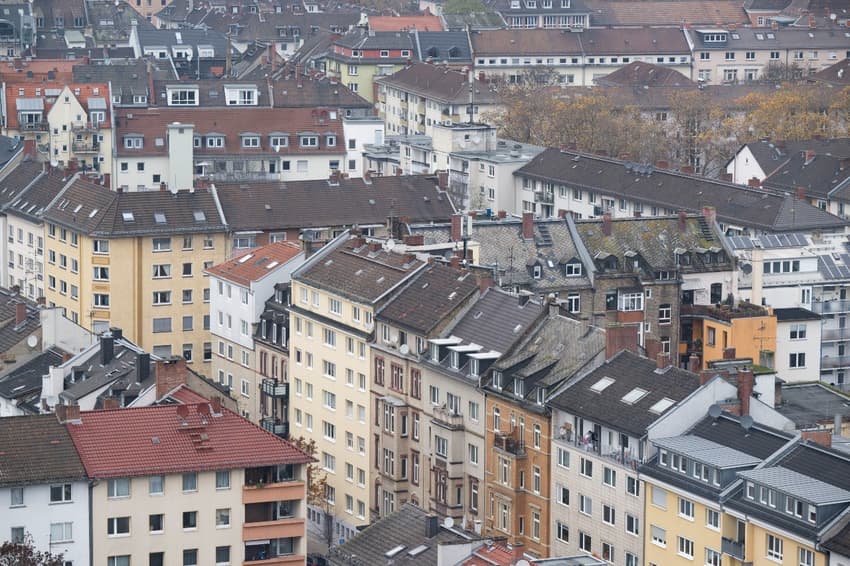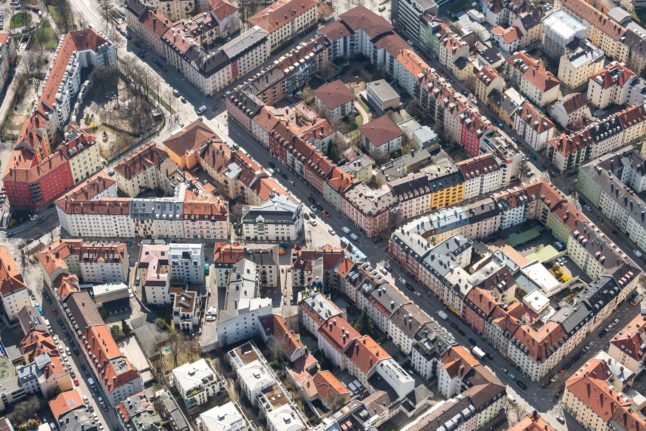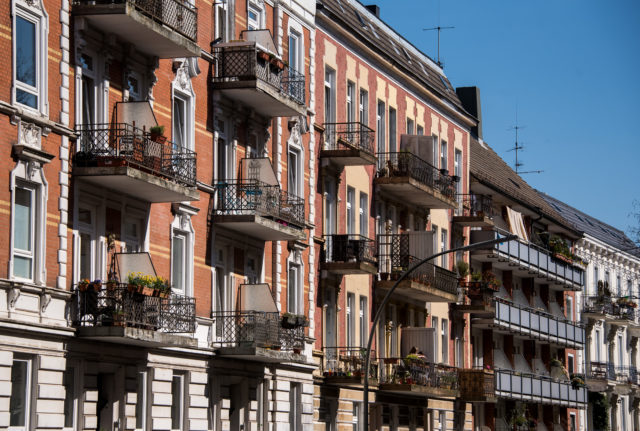Is it better to buy or rent in Germany right now?

Property prices are expected to fall in Germany this year. But with the cost of living rising, is it a good time to buy? Or is renting the safest option? Here are a few points to consider.
Looking to move? Find your next rental apartment here.
The property boom looks like it's starting to subside in Germany. But with growing interest rates, the rising cost of living, increasing construction costs and other factors affecting the supply on the market - buying a home is still a difficult prospect. But tenants in rented accommodation are also having to dig deeper into their pockets as rents soar.
This situation will no doubt have people considering whether it's worth putting their savings into buying a home in Germany - or if they should stick to renting.
We've gathered a few points to consider.
Your financial situation - and the economy in general
Whether renting or buying is really economically better in the long run depends first of all on you and your family's financial burden - and this is currently rising for most people in Germany amid the cost of living crisis.
Interest rates have jumped significantly in recent months. Even if financing is still fairly moderate in historical terms, with an interest rate of 3.6 percent per year (end of December 2022), it is becoming more difficult for households to get onto the property ladder.
Even a small rise in interest rates can increase the monthly cost of mortgages by hundreds of euros. Furthermore, many other costs have risen due to high inflation, which further reduces monthly household budgets.
The inflation rate in Germany is dropping slightly, but it remains to be seen if the economy will stabilise in the coming months, or if it will take longer.
READ ALSO: Why falling property prices in Germany mean tougher times for tenants
Is Germany's property boom really over?
Experts are still not sure whether this is a period of shock or if the real estate market is actually facing a downward spiral.
Some industry experts say they believe there will be a clear drop in property prices this year.
The German Institute for Economic Research (DIW), for instance, considers it possible that there will be a decline in house prices of up to 10 percent in 2023.
Others, including the CEO of the Vonovia real estate group, Rolf Buch, do not expect a huge drop.
However, there is almost unanimous agreement among experts that value increases in the coming years will be significantly less dynamic than in previous years.

An aerial view of flats in Munich. Photo: picture alliance/dpa | Sina Schuldt
Vonovia's CEO Buch said: "Of course, we won't see the value increases of the past years anytime soon, but values will remain largely stable." He said the reason for this is that demand is still higher than supply.
Real estate expert Michael Voigtländer at the Institut der deutschen Wirtschaft (IW) agrees.
He said: "When a high demand for housing meets a shortage of supply, that supports prices." And there is still too little being built in Germany to meet demand, he added.
Experts also say that immigration from abroad, which plummeted during the pandemic, will further push up the demand for housing, especially in cities.
In less sought-after regions, however, prospective buyers should be cautious. In the long term, property value developments on the real estate market will be determined primarily by the economic as well as demographic developments of the respective regions. As early as spring 2022, before the market uncertainty, a Postbank study concluded that in the vast majority of German regions, the price boom will come to an end by 2035 because of these prospects.
So it remains the case that location is one of the best protections in 2023 for your dream property continuing to increase in value, and one of the key considerations for whether a decision to buy will ultimately pay off in the long term.
READ ALSO: What experts say will happen to the German housing market in 2023
Is the price actually worth it?
Sometimes owning a flat doesn't mean you'll reap the economic benefits. In order to avoid making a decision that will cost you dearly, prospective buyers should not only consider the potential increase in value of a property, but also the current price level.
It's important to think about whether owning a home at the current buying prices - or sticking to renting - makes sense, as the low interest rates of recent years have meant that rents have risen much more slowly than purchase prices.

Flats in Hamburg's Eimsbüttel area. Photo: picture alliance/dpa | Daniel Bockwoldt
The purchase price-rent ratio offers a good yardstick for this and helps to estimate the price level in a particular city or region. It serves as an essential comparative value for or against a property purchase and measures how many years it takes prospective buyers to pay off a property with an average achievable rent. The purchase price-to-rent ratio is calculated by dividing the purchase price including ancillary costs by the annual 'cold rent' (not including bills) for a comparable property.
The lower the value, the better for the buyer. The higher the value, the more likely prospective buyers should remain tenants in the area. Values of 20 (that means 20 years until a property is paid off) are still considered cheap in Germany. From values of 25, properties tend to be considered expensive and from values of 35, prospective buyers should refrain from buying, according to many experts.
Here's an example from Germany's Focus news site: You have your eye on a three-room flat with 100 square metres of living space for €420,000 (including all ancillary costs such as land register, notary, estate agent, etc.) and now want to determine the purchase price-rent ratio. First look at larger property portals such as Immowelt or Immoscout to see what rents are currently asked for in comparable flats in the local area. Assuming you arrive at a gross rent of €1,000 per month, this gives a value for the purchase price-rent ratio of 35 (420,000 / 12,000). Result: the flat is too expensive to buy by these standards.
This property/rent calculator from real estate site Immowelt can help you if you're considering this point.
Your personal preference (and expert guidance)
The decision to rent or buy a property is always deeply personal and depends on lots of factors aside from money, such as where you want to live, who you are living with and what makes you feel most stable.
For that reason you have to follow your gut instinct and do what's best for you. If you're considering buying, check out expat forums or talk to friends who've bought a place in Germany to find out their experiences. And make sure to get in touch with a professional financial advisor or mortgage adviser for guidance before you take the plunge.
Good luck!
READ ALSO: EXPLAINED: What you need to know about buying property in Germany
Comments
See Also
The property boom looks like it's starting to subside in Germany. But with growing interest rates, the rising cost of living, increasing construction costs and other factors affecting the supply on the market - buying a home is still a difficult prospect. But tenants in rented accommodation are also having to dig deeper into their pockets as rents soar.
This situation will no doubt have people considering whether it's worth putting their savings into buying a home in Germany - or if they should stick to renting.
We've gathered a few points to consider.
Your financial situation - and the economy in general
Whether renting or buying is really economically better in the long run depends first of all on you and your family's financial burden - and this is currently rising for most people in Germany amid the cost of living crisis.
Interest rates have jumped significantly in recent months. Even if financing is still fairly moderate in historical terms, with an interest rate of 3.6 percent per year (end of December 2022), it is becoming more difficult for households to get onto the property ladder.
Even a small rise in interest rates can increase the monthly cost of mortgages by hundreds of euros. Furthermore, many other costs have risen due to high inflation, which further reduces monthly household budgets.
The inflation rate in Germany is dropping slightly, but it remains to be seen if the economy will stabilise in the coming months, or if it will take longer.
READ ALSO: Why falling property prices in Germany mean tougher times for tenants
Is Germany's property boom really over?
Experts are still not sure whether this is a period of shock or if the real estate market is actually facing a downward spiral.
Some industry experts say they believe there will be a clear drop in property prices this year.
The German Institute for Economic Research (DIW), for instance, considers it possible that there will be a decline in house prices of up to 10 percent in 2023.
Others, including the CEO of the Vonovia real estate group, Rolf Buch, do not expect a huge drop.
However, there is almost unanimous agreement among experts that value increases in the coming years will be significantly less dynamic than in previous years.

Vonovia's CEO Buch said: "Of course, we won't see the value increases of the past years anytime soon, but values will remain largely stable." He said the reason for this is that demand is still higher than supply.
Real estate expert Michael Voigtländer at the Institut der deutschen Wirtschaft (IW) agrees.
He said: "When a high demand for housing meets a shortage of supply, that supports prices." And there is still too little being built in Germany to meet demand, he added.
Experts also say that immigration from abroad, which plummeted during the pandemic, will further push up the demand for housing, especially in cities.
In less sought-after regions, however, prospective buyers should be cautious. In the long term, property value developments on the real estate market will be determined primarily by the economic as well as demographic developments of the respective regions. As early as spring 2022, before the market uncertainty, a Postbank study concluded that in the vast majority of German regions, the price boom will come to an end by 2035 because of these prospects.
So it remains the case that location is one of the best protections in 2023 for your dream property continuing to increase in value, and one of the key considerations for whether a decision to buy will ultimately pay off in the long term.
READ ALSO: What experts say will happen to the German housing market in 2023
Is the price actually worth it?
Sometimes owning a flat doesn't mean you'll reap the economic benefits. In order to avoid making a decision that will cost you dearly, prospective buyers should not only consider the potential increase in value of a property, but also the current price level.
It's important to think about whether owning a home at the current buying prices - or sticking to renting - makes sense, as the low interest rates of recent years have meant that rents have risen much more slowly than purchase prices.

The purchase price-rent ratio offers a good yardstick for this and helps to estimate the price level in a particular city or region. It serves as an essential comparative value for or against a property purchase and measures how many years it takes prospective buyers to pay off a property with an average achievable rent. The purchase price-to-rent ratio is calculated by dividing the purchase price including ancillary costs by the annual 'cold rent' (not including bills) for a comparable property.
The lower the value, the better for the buyer. The higher the value, the more likely prospective buyers should remain tenants in the area. Values of 20 (that means 20 years until a property is paid off) are still considered cheap in Germany. From values of 25, properties tend to be considered expensive and from values of 35, prospective buyers should refrain from buying, according to many experts.
Here's an example from Germany's Focus news site: You have your eye on a three-room flat with 100 square metres of living space for €420,000 (including all ancillary costs such as land register, notary, estate agent, etc.) and now want to determine the purchase price-rent ratio. First look at larger property portals such as Immowelt or Immoscout to see what rents are currently asked for in comparable flats in the local area. Assuming you arrive at a gross rent of €1,000 per month, this gives a value for the purchase price-rent ratio of 35 (420,000 / 12,000). Result: the flat is too expensive to buy by these standards.
This property/rent calculator from real estate site Immowelt can help you if you're considering this point.
Your personal preference (and expert guidance)
The decision to rent or buy a property is always deeply personal and depends on lots of factors aside from money, such as where you want to live, who you are living with and what makes you feel most stable.
For that reason you have to follow your gut instinct and do what's best for you. If you're considering buying, check out expat forums or talk to friends who've bought a place in Germany to find out their experiences. And make sure to get in touch with a professional financial advisor or mortgage adviser for guidance before you take the plunge.
Good luck!
READ ALSO: EXPLAINED: What you need to know about buying property in Germany
Join the conversation in our comments section below. Share your own views and experience and if you have a question or suggestion for our journalists then email us at [email protected].
Please keep comments civil, constructive and on topic – and make sure to read our terms of use before getting involved.
Please log in here to leave a comment.